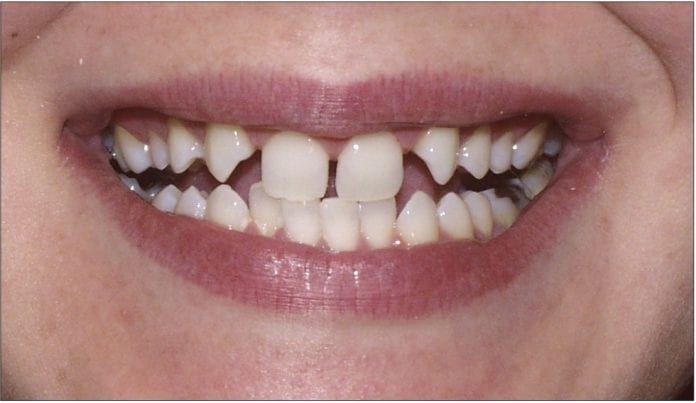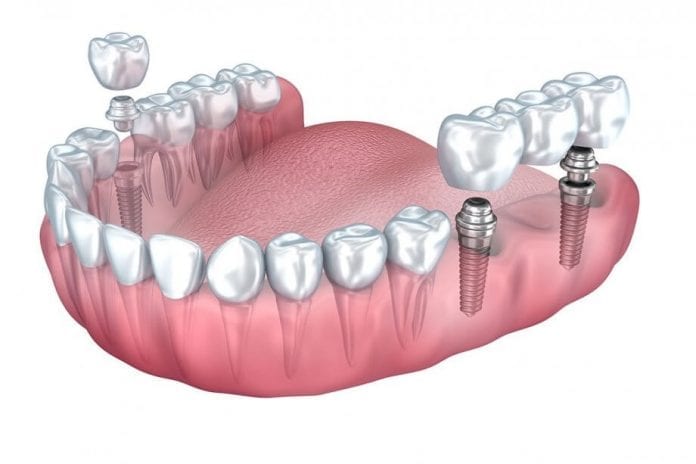Many people have dental health problems, and if a simple problem like a cavity or chipped tooth is ignored for too long, the situation can become serious, leading to an extraction. No big deal, right? It’s true that people have teeth pulled due to damage or lose them from trauma all the time, but once that tooth is gone, you have other problems to solve. Missing teeth can cause a variety of issues, from tooth shifting to nutritional problems – which is why most dentists recommend getting one or more dental implants to fix the problem.
The Problem Of Missing Teeth

Before diving into the dental implant options, it’s important to understand just why implants are important. After all, many people are missing teeth and choose to forego implants, or simply can’t afford to get them, and they may not seem to have any real problems. Without proper intervention, however, missing adult teeth can cause:
- Tooth Shifting: Our teeth naturally shift over the course of our lives. Just think about teens who have braces and then don’t wear their retainers – their teeth move back out of alignment, and that’s in a mouth with a complete complement of teeth. Any time you lose a permanent tooth, though, it leaves a gap in your mouth, and since your teeth aren’t affixed to your jaw, over time the neighboring teeth can shift into that space.In the short term, tooth shifting can be kept at bay by placing a metal space maintainer around a neighboring tooth, but over time, these often come loose and they can make it difficult to eat certain foods. And when your teeth shift, that causes overall misalignment, which can lead to jaw problems.
- Nutritional Issues: Remember when you were missing your front teeth as a kid and it was hard to bite into an apple or eat other crunchy foods? Unsurprisingly, missing adult teeth cause similar problems. So, while having one or two missing teeth likely won’t compromise your nutritional status, once you’re missing more than a few teeth, it can be hard to chew properly, leading to a restricted diet and problems getting all the calories and nutrients you need.
- Bite Collapse: Bite collapse – a situation characterized by the loss of facial structure – is rare in younger people, but for older adults who are missing a lot of teeth or whose teeth are severely worn down, it can be a serious problem. The condition is made more obvious by the loss of facial fat and skin elasticity in older people, as well as bone loss in the jaw, and depending on jaw health issue. This bone loss represents a particular problem because it also makes it harder to place dental implants.
Implant Options

Given the serious consequences of missing teeth, it makes sense that people often pursue some type of implant, but dental implants aren’t as simple as plugging a fake tooth into the empty space. It actually takes a long time to place complete implants, even if you’re only missing a few teeth. What’s the hold up?
A dental implant is made up of three parts: a titanium implant that is drilled into the bone and fuses with it over time, a middle piece known as the abutment, and the outer, fake tooth, known as a crown. When a dental professional places an implant, then, they first have to perform any necessary extraction, allow that to heal, and then place each of those three parts over the course of separate appointments. Many people spend an entire year dealing with the implant process. This shouldn’t come as a surprise since even just placing a crown typically takes several appointments, and that’s a much simpler and less invasive process.
If implants are so complicated, why not just get traditional dentures? According to Dr. Bret Dyer, implants allow for optimal function, as well as better aesthetic outcomes relative to dentures. For example, with implants, you can eat anything you want once they’ve healed, but many people with dentures still struggle with hard or chewy foods. Because dentures simply fit into the mouth, hooking around any remaining teeth, they also tend to be less comfortable than implants. Additionally, dentures leave users vulnerable to bite collapse in a way that implants generally don’t.
Potential Risks
Dental implants are a form of invasive oral surgery, so it’s important to understand the risks and to take proper care of your mouth during the healing process. Nathan G. Russell of Bremerton Dental has said, “Though many patients inquire about dental implants, it isn’t always a perfect fit for their situation. But if you’re in good health and have healthy gums and adequate bone to support an implant, then you are a good fit. Although, you must be committed to thorough oral hygiene to keep your mouth healthy and to scheduling regular dental visits. Among other things, it’s very important that you don’t smoke when receiving implants because smoking damages the cells in your mouth, and decreases oxygenation. That can cause the cells in your gums and jaw to die or develop an infection, and you can lose the implant.
Another major problem that people encounter when receiving dental implants is poor overall oral health. Of course, oral health problems often necessitate implants in the first place, but dentists won’t start the implant process if they don’t think you’re a good candidate. Unfortunately, some fail to detect infections in neighboring teeth or other oral health problems, such as bone loss in the jaw, before starting the process.
Finally, people with diabetes may not be good candidates for dental implants because diabetes impairs the body’s healing abilities. They can also be dangerous for people who are immunocompromised or have heart issues. While dental implants typically have better long-term outcomes and can prevent cavities in neighboring teeth and help maintain jaw bone health, failed implants can be very dangerous. A skilled prosthodontist or cosmetic dentist will carefully evaluate not just your oral health, but your overall suitability for this procedure, especially if you’ll be receiving a large number of implants.
The Smile Says It All
Getting dental implants is a long, difficult process, but when all is said and done, the result will be a smile that’s not just attractive, but also functional. Especially if you’ve lived with missing teeth for an extended period, you may be surprised by just how much better it feels to have a complete set of teeth again. In terms of comfort, function, and confidence, there’s nothing like dental implants to help you feel more like yourself.









